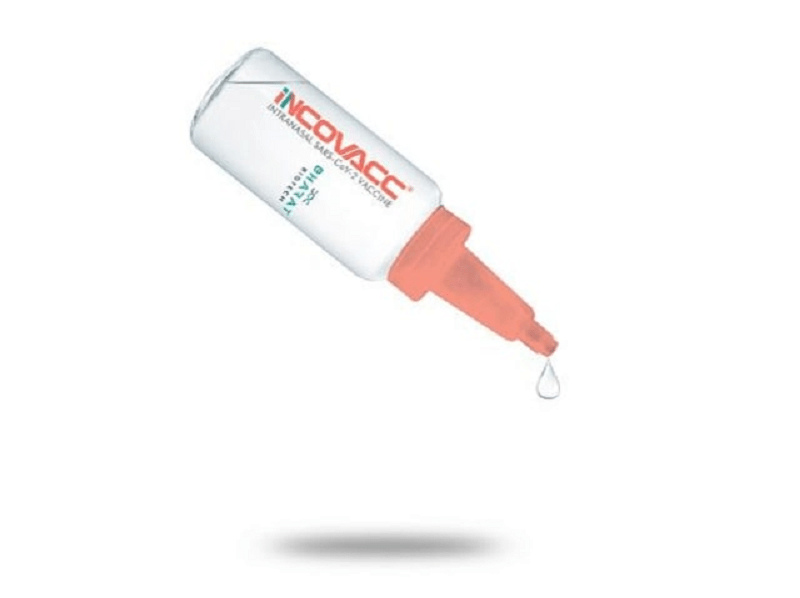The Drugs Controller General of India (DCGI) on Tuesday approved the country’s first intra-nasal Covid-19 vaccine — Bharat Biotech’s iNCOVACC — for restricted emergency use in those aged above 18 years. It’s only the second such vaccine in the world, after CanSino Biologics’ vaccine in China, to get regulatory approval. Around 100 mucosal (nose and mouth) Covid-19 vaccines are under development across the world.
iNCOVACC is a chimpanzee adenovirus vectored recombinant nasal vaccine that has been specifically formulated to allow intra-nasal delivery through nasal drops. The nasal delivery system has been designed and developed to be cost effective in low- and middle-income coun¬tries, the company said. The vaccine is stable at 2-8°C.
Union Health Minister Mansukh Man¬daviya said the vaccine has been approved for “primary immunisation against Covid-19 in the 18+ age group for restricted use in emergency situation”.
The development, he tweeted, would further provide a boost to “our collective fight” against the pandemic.
Krishna Ella, chairman and managing director, Bharat Biotech, called iNCOVACC “a global game changer” in the intra-nasal vaccine technology and delivery systems. “Despite the lack of demand for Covid-19 vaccines, we continued product development in intra-nasal vaccines to ensure that we are well prepared with platform technologies for future infectious diseases…iNCOVACC has been designed for efficient distribution and easy administration,” he said.
Sources in Bharat Biotech said there would be no scalability issue with the intra-nasal vaccine, which is based on the viral vector platform. The company’s Covid-19 vaccine Covaxin (inactivated virus vaccine) had issues about fast scaling up due to low yields.
Intra-nasal Covid-19 vaccines can prime immune cells in the thin mucous membranes of the nose and mouth, the spot through which the Sars-CoV-2 virus enters the body. Therefore, it can stop the virus from replicating at its entry and spreading to the lungs and other parts of the body. Vaccine developers feel that mucosal vaccines will be successful in preventing mild cases of illness and blocking transmission to other people.
Bharat Biotech has said that an intra-nasal vaccine stimulates a broad immune response – neutralising IgG, mucosal IgA, and T Cell responses. “Immune responses at the site of infection (in the nasal mucosa) are essential for blocking both infection and transmission of Covid-19,” the company said.
Experts say it is indeed a good idea to have a vaccine that will induce local (mucosal) immunity at the point of entry of the virus. Jacob John, senior virologist and former head of the departments of clinical virology and microbiology at Christian Medical College (CMC), Vellore, told Business Standard that the incubation period of the Sars-CoV-2 virus is declining with every new variant. “Now it is down to three days. For the memory of immunity to kick in and raise one’s antibody level, it takes five to six days. That is why we have annual flu vaccines, so that there is a periodic boosting of our antibody levels and some spillover antibodies are on the nasal mucosa,” John said.
The flu virus has a 1.5-day incubation period. John added that the same principle applies to Omicon and its sub-variants. Therefore, as a booster, one would need to take the intra-nasal vaccine periodically.
Trupti Gilada, infectious disease specialist at Masina Hospital, Mumbai, said, “Vaccines work most efficiently when given through the same route through which the virus enters the body. In the case of Covid, it is the nasal route. This is because nasal vaccines also help develop local immunity which is Immunoglobulin-A, which lines the nasal and respiratory mucosa. These antibodies act as the first line of humoral immunity much before the blood antibodies get a chance to fight the virus. This same principle was also used for the oral polio vaccine.”
Doctors feel that the latest vaccine will be a game changer and reduce burden on the health system. “The major game changer potential of this vaccine is because of its capacity to cut down the transmission rate of this infection in the society which not only impacts the health issues but also decreases the burden on health infrastructure,” said Rahul Sharma, additional director (pulmonology), Fortis Hospital, Noida.
Two separate and simultaneous clinical trials were conducted to evaluate the intra-nasal vaccine: as a primary dose (2-dose regimen), and a heterologous booster dose for subjects who had already received two doses of the two commonly administered Covid vaccines in India – Covishield and Covaxin.
The Hyderabad-based company has already established large manufacturing capabilities at multiple sites across India — Gujarat, Karnataka, Maharashtra and Telangana, the company had said on August 15.
New defence against covid
Key attributes of Incovacc
1.Stimulates a broad immune response, neutralising antibody (IgG, mucosalIgA) and T cell responses
2.Immune responses at the site of infection (nasal mucosa) essential for blocking both infection and transmission of Covid-19
3.Non-invasive, needle-free
Ease of administration:
1.Does not require trained health care workers
2.Scalable manufacturing
-Source-ANI

